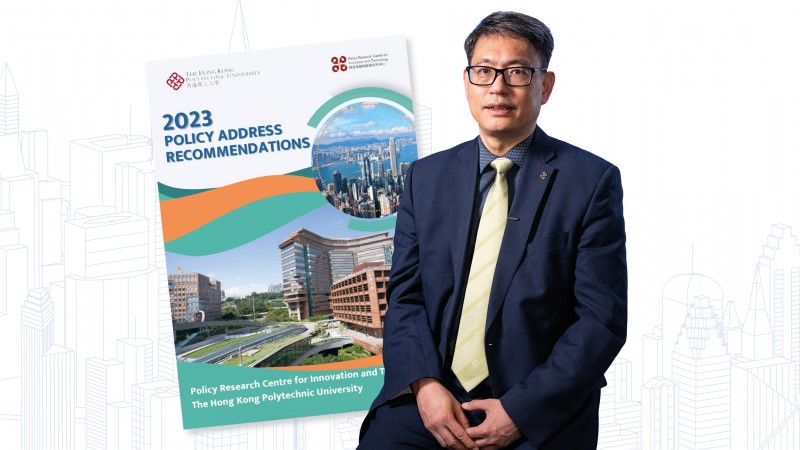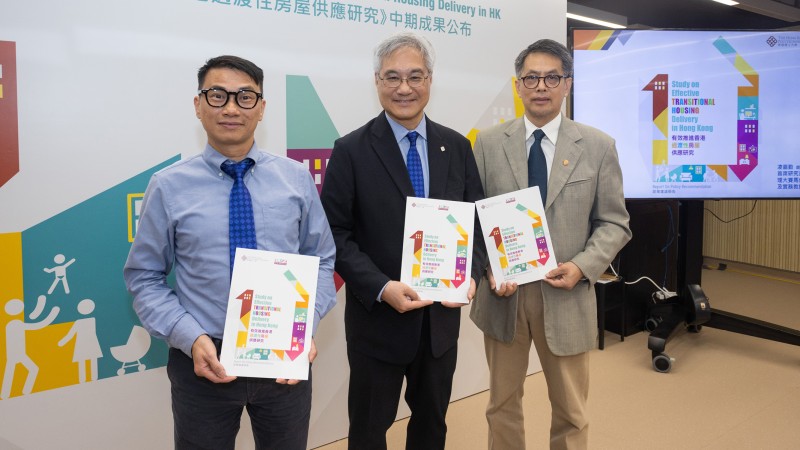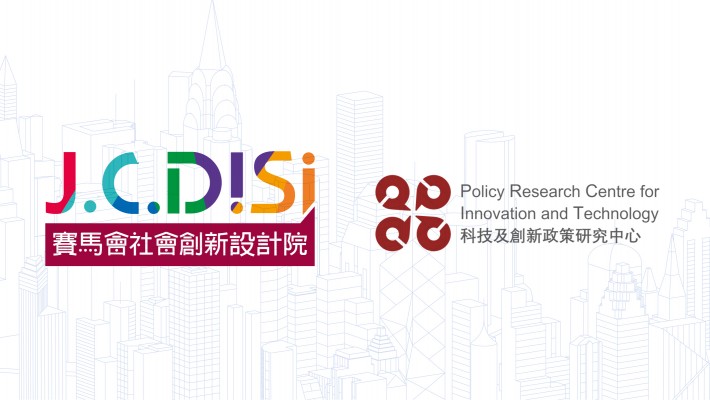Policy recommendations for societal benefits
PolyU’s research efforts serve the important goal of advising policymakers on various issues of public concern, with proposals made recently by the Jockey Club Design Institute for Social Innovation (J.C.DISI) and the Policy Research Centre for Innovation and Technology (PReCIT).
PReCIT has made recommendations for the HKSAR Chief Executive’s 2023 Policy Address in three crucial areas:

Carbon neutral cities
Policy and legal studies on the promotion of hydrogen fuel cell vehicles
Encouraging the development of the green economy and international carbon market
Enhancing global and regional collaborations in building carbon neutral cities
Promoting the green deck to publicise the concept of sustainable development
Reducing the time for building energy audits and optimising ventilation systems
Automatic food waste collection and dewatering system for sustainable waste management
Belt and Road (BRI) development
Establishing BRI I&T hub
Establishing BRI government-industry-academia- research consortium
Establishing BRI countries outstanding student grant and loan schemes to attract talents
Establishing scholarships and research funding schemes to promote academic collaborations between Hong Kong and the BRI countries
Promoting tourism and cultural exchange initiatives in the BRI countries
Facilitating cross-border trade activities in the BRI
Greater Bay Area I&T development
Adopting PolyU Innovation and Technology Index as an indicator of Hong Kong’s I&T development
Building a university town in the Northern Metropolis to establish a seamless innovation ecosystem
Establishing an international education hub to attract global talents to Hong Kong
Building a central research platform for Chinese Medicine (CM) and an international dietary supplement research centre
Establishing an international data centre and a supercomputing centre
Optimising AI laws and regulations and promoting Legal Entity Identifier (LEI) applications exploration
| Policy Paper on University-Industry Collaboration for Chinese Medicine Innovation in the GBA Co-authored by PReCIT and PolyU’s Research Centre for Chinese Medicine Innovation (RCMI) last September, the Policy Paper outlines recommendations for policymakers on capitalising on the opportunities arising from the dynamic consumer market and talent pool in the GBA with the aim of fostering the development and innovation in the traditional CM industry. Key recommendations are:
|
| PReCIT launches inaugural PolyU Innovation and Technology Index In August, PReCIT released for the first time the PolyU Innovation and Technology (I&T) Index, which compares the I&T strengths and challenges of Hong Kong with those of various regions in Greater China, as well as among four major bay areas in the world, with respect to five areas, namely R&D, startups, talent, industry, and impact. It was found that the top three regions for I&T in Greater China are Guangdong, Jiangsu, and Beijing in that order, whereas Hong Kong ranks seventh. The I&T rankings of the four major bay areas are: first, San Francisco Bay Area; second, Tokyo Bay Area; third, Guangdong-Hong Kong-Macao Greater Bay Area (GBA); and fourth, New York Bay Area. Recommendations for Hong Kong include increasing R&D expenditure, encouraging patent licensing, accelerating new industrialisation, embracing the digital economy, and accelerating GBS integration, among others. |
J.C.DISI’s study reviewing HK’s transitional housing programme

Supported by the Strategic Public Policy Research Funding Scheme, the research project is led by Prof. Ling Kar-kan, Director of J.C.DISI of PolyU (centre); Dr Raymond Tam, Teaching Fellow of the Department of Applied Social Sciences at PolyU (left) and Dr Calvin Luk, Project Manager (Spatial) of J.C.DISI of PolyU (right).
Meanwhile, J.C.DISI released interim findings on the Study on Effective Transitional Housing Delivery in Hong Kong in August, with multiple policy recommendations.
To relieve the pressure on those with urgent housing needs, the HKSAR Government plans to complete 84 transitional housing projects and provide over 21,000 housing units by 2024-25. The Study examined 35 projects located at open-air sites with newly constructed relocatable units using Modular Integrated Construction (MiC) technology, which account for about 86% of transitional housing units delivered under the programme.
After comparing Hong Kong’s transitional housing programme with programmes in other cities using relocatable building structures, the Study concludes that Hong Kong’s programme is the most unprecedented in terms of scale and development speed, while having the widest societal participation. The Study supports the Government taking up the role of a builder in the Light Public Housing (LPH) programme to enhance the efficiency of delivery, and proposes to:
Recognise the function and position of transitional housing
Integrate transitional housing and LPH
Standardise the design of MiC units
Assist tenants to settle down in the Northern Metropolis
Engage NGOs in community making in LPH development
Advance planning on the re-use of MiC units
The University founded J.C.DISI in 2012 to facilitate proactive policy advocacy and social innovations through trans-disciplinary research. PReCIT was established in 2022 with the aim of becoming an influential voice on development strategy and related policies in the field of innovation and technology.


